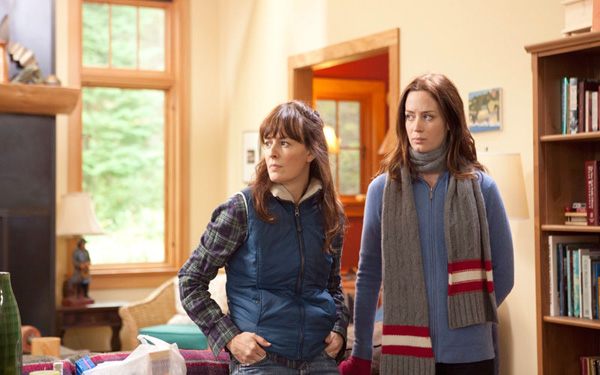
Rosemary DeWitt, left, and Emily Blunt (Tadd Sackville-West/IFC Films)
Im amazed to find myself saying this, but thanks to Mark Duplass, director Lynn Sheltons latest film is worth seeing. Barely. Well, this isnt entirely trueits actually thanks to the trio of talented lead actors, which rounds out with Emily Blunt and Rosemarie DeWitt. (These two I knew I shouldnt miss, but Duplass surprised me with magnetism and depth I hadnt noticed before.) Apart from the sheer talent of the cast, though, the film falls flat on its face.
Maybe Im not being fair. There is a lot to be impressed by in the acting, as Ive said, but also in the cinematography of Benjamin Kasulke, whose early (yet highly prolific) career is a kind of survey of some of the most pertinent micro-budget films of the last five to six years (The Catechism Cataclysm, Nights and Weekends, Brand Upon the Brain!). This filmand Sheltons previous Sundance darling, 2009s Humpdayare quite accomplished feats of technical ability, both resembling romantic comedies of higher budgets and scope. The look of Your Sisters Sister, set in a Pacific Northwest cabin outside of Sheltons home base of Seattle, is especially nice, a careful and subtle mix of realistic hand-held scene coverage and outdoor scenic beauty.
But aside from all that, it has an ending that I just cant abide. The plot starts off really good. Duplass plays Jack, who a year earlier suffered the loss of his brother, with whom he shared a close but contentious relationship. His feelings in a tangle, he seeks solace at a cabin owned by the family of his best friend, Iris (Emily Blunt), only to find her eclectic and self-reliant half-sister, Hannah (Rosemarie DeWitt), is occupying the space. She has just split from her girlfriend and hitchhiked her way to the island. After a fun night of swigging tequila (one of the best scenes of the film), the two somehow end up in bed together before Iris, who is secretly in love with Jack, arrives the following day to check up on him. A unique and rich love triangle appears before our very eyes as the three make the various transitions from the scripted dialogue to improvisation look effortless and feel seamless.
Shelton brings us to a fever pitch as the three mingle on the morning of Iriss arrival, but offers zero in the way of resolution. I truly felt gipped. After a series of complicated encounters between the three of them with surprising revelations about each, Jack is at his highest level of emotional confusionmostly about how he feels toward each sister. For reasons unknown to me, but what I might assume is a lack of a better idea, Shelton has him taking a long bike ride during an acoustic guitar-fueled last act montage, completely defusing the drama. He returns to miraculously say exactly what he needs to say to each woman in order to neatly resolve the situation. They all kiss and make up. And then the movies over.
What? For a smart and relevant young writer/director like Sheldon, I just find this ending to be inexcusable. Youve got to leave your audience with more than just a good feeling. An ending is a chance to leave the audience with something meaningful. Without imparting a message, what are we making here? This is a film with a lot of good reasons to go see it, which makes the thematically truncated climax an even bigger bummer. Dare I say it: if you dont have anything to say, dont say anything at all.






Leave A Comment